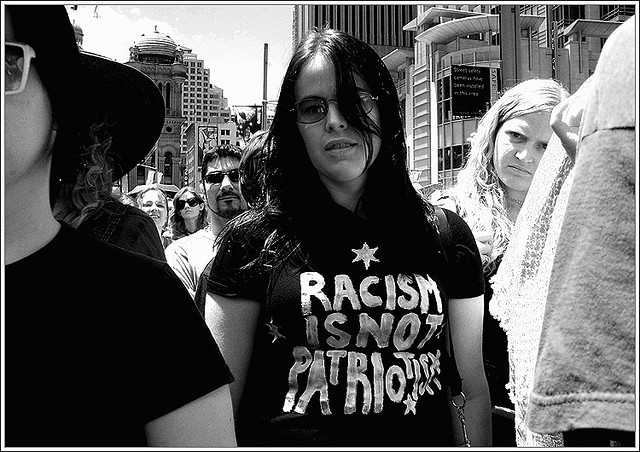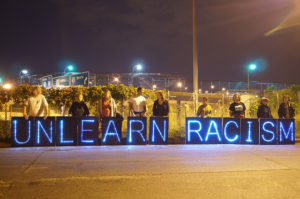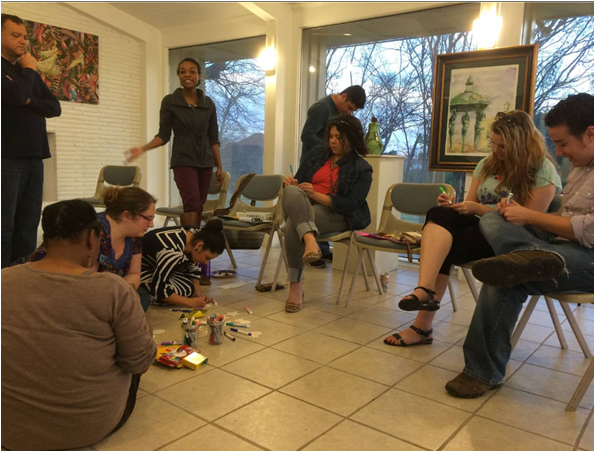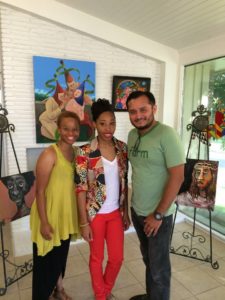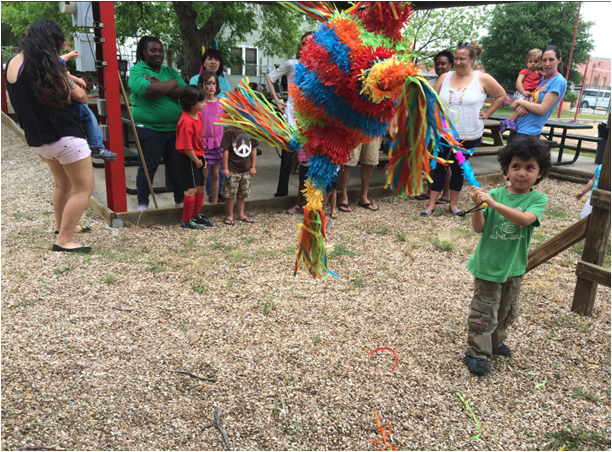By Kyle Massey
I am aware that the title of this article may have alarmed you. In our society, people don’t usually go around proclaiming to be racist. Therefore, it probably catches your attention when I say “I’m white, and I’m racist”. Well, it’s true, I don’t deny my racism. This may seem provocative, but let me explain.
Our society is one that was built on, and continues to be, a system of exploitation and oppression of people of color by white people. This is historically based and institutionally perpetuated. This racist social structure is designed for white people to maintain and defend a system of wealth, power, and privilege. This structural racism—the forms of racism that act visibly and invisibly in our institutions—is a principal component of the fabric of our society, whether we see it or not, and manifests itself in practically every element of our social structures. Our nation’s policies and systems of education, immigration, [in]justice, healthcare, housing, and employment, for example, have been, and continue to be, deeply influenced by structural racism. That is, structural racism works through willing and unwilling actors through these social structures to produce and reproduce cumulative, durable, race-based inequalities to privilege the white majority.
It’s in the air we breathe
Structural racism is so deeply ingrained in our society, in everyday behaviors, practices, thoughts, and actions that exposure to it is inescapable (but not unresolvable). It is simply impossible to have grown up in a white supremacy as a member of the majority and not have absorbed racist beliefs or tendencies of some kind. It’s in the air we breathe. This is why white people contribute to the creation of a racist society. There, I said it: white people are racist.
If you’re a white person reading this, you may be feeling a bit defensive right now. You may be thinking to yourself that you are not racist because you have friends who are black or because you don’t go around yelling racist slurs at people of color. It is important to recognize that racism is not just outward and visible actions, it is also the biased ideas we might hold deep inside, that we don’t voice. Our racism takes many forms and because our white supremacist society has normalized and legitimated racist thoughts and actions for so long, white people are not always able to spot their own racism. The oppressed in our society, however, recognize it and are hurt by it every day… so if you’re having trouble identifying the ways you might show racism, just go ask some of your friends who are not white.
Although white people in our society perpetuate this state of racism, I am not suggesting that all white people feel hatred toward people of color or even harbor ill feelings about them. What I am saying is that all white people have, in some way, been privileged and socialized on the basis of race by our white supremacist (racist) society. I am complicit because I am a member of the white majority in a white supremacy – I am a member of the group that holds the power in our society. I have grown up in this environment while occupying this particular identity, and therefore I have taken on some of the prejudices.
Although this blog post focuses on race, we should also acknowledge that advantage and disadvantage works in different constellations and that social race is only one axis among many (ability, gender, economic status, religion, sexual orientation, etc.).
The shame is denying our privilege
It may not have necessarily been my fault that racist things have been ingrained in me because, as I have said, it’s impossible to avoid this in a white supremacist society. The most shameful and destructive part, however, is when white people deny it: when we deny our privilege, when we don’t own up to the damage we cause, and when we don’t put in the effort to understand it or to figure out how to transform ourselves. Instead of denying our racism, we must call it out and be intentional about working toward understanding and transformation. And it is work. While structural racism is pervasive and has been a major component in the framework our society, it is also very sophisticated, and, in a way, elegant. It easily disguises itself. Various forces within the system of structural racism continually work to deny, minimize, and ultimately uphold itself. Working to unpack it so the racism is recognizable can be challenging work for the privileged in society.
There is of course a massive variation in how racism manifests itself in and through us. Some white people commit murder and hate crimes on the basis of race. Some people belittle other people’s cultures. Some white people discriminate based on race in hiring processes within employment settings. For others, their racism manifests in less overt ways. Some people may laugh at racist jokes, for example, or cross the street when walking along a sidewalk to avoid crossing paths with an oncoming black pedestrian. Still others may observe racist acts committed by others and choose not to speak up. Such inaction is complicity. These less overt examples of racism, often called microaggressions, are certainly not of the same magnitude as violent hate crimes, but they do share the same origins and are intrinsically linked.
I didn’t ask to be racist. It’s not something that I want. But, whether or not I like it, I have been shaped by our dominant culture, our racist culture. Similarly, I didn’t ask for white privilege, but it was given to me. I cannot give it back any more than I could have chosen not to take it. What I can do is own it, and I do own my privilege. What I mean is that I work to identify it, describe it, and call it out with the hope of lessening it.
Racist by conditioning, antiracist by choice
Even more importantly, I am an antiracist. I’m racist by conditioning, but I am an antiracist by choice. I choose to challenge white privilege and the oppression of people of color. But, just because I choose to be an antiracist doesn’t mean that I no longer carry around some of the traces of racism to which I have been exposed and poisoned by all my life. So, fellow white people, although racism is part of who we are, it is not all of who we are. We can all make the choice to be an antiracist, an ally, an activist, or whatever you want to call it. But we can’t actually embody these roles in society unless we first recognize and deal with our own racism, not deny it. I believe it is important, perhaps even necessary, for true transformation that each white person in our society comes to a place where they are able to say, “I’m white and I’m racist and I’m going to do something about it”.
And doing something about it will be the focus of Part 2 of this blog series, which will be posted here next Sunday. This second post will focus on the various ways that all people, as antiracists, can work toward equity and inclusion in our community and in our society more broadly.
 Kyle Massey is an educator, student, and scholar. Kyle lives and works in Waco, Texas. In addition to his fulltime job as a higher education administrator, in the evenings Kyle teaches undergraduate courses in geography and leadership studies. He is a PhD student at the University of Texas at Austin in the College of Education. Kyle’s research interests include topics related to global citizenship, geography education, and the ways in which various aspects of curriculum and teaching in higher education shape student learning experiences, especially with respect to social and cultural understandings. You can contact Kyle at [email protected], follow him on Twitter @kyledmassey, and check out his website at www.kyledmassey.com
Kyle Massey is an educator, student, and scholar. Kyle lives and works in Waco, Texas. In addition to his fulltime job as a higher education administrator, in the evenings Kyle teaches undergraduate courses in geography and leadership studies. He is a PhD student at the University of Texas at Austin in the College of Education. Kyle’s research interests include topics related to global citizenship, geography education, and the ways in which various aspects of curriculum and teaching in higher education shape student learning experiences, especially with respect to social and cultural understandings. You can contact Kyle at [email protected], follow him on Twitter @kyledmassey, and check out his website at www.kyledmassey.com
The Act Locally Waco blog publishes posts with a connection to these aspirations for Waco. If you are interested in writing for the Act Locally Waco Blog, please email [email protected] for more information.
[Photo 1 by Flickr user pigeonpoo – used under Creative Commons licensing]
[Photo 2 by Flickr user Light Brigading – used under Creative Commons licensing]
by Kelly McDonald
The second Affordable Health Care Act Insurance Marketplace open enrollment period kicked off on November 15. Get Covered America along with the Family Health Center, Providence Hospital, Baylor Scott & White Hillcrest Medical Center, Heart of Central Texas Independent Living Center, and Planned Parenthood are hosting health insurance enrollment events and encouraging McLennan and surrounding residents to sign up for quality, affordable health coverage. The open enrollment and renewal period that began Saturday, November 15 runs through December 15 for health plans that start or renew on January 1, 2015.
Last open enrollment period over 733,000 Texans got covered (3,733 of those from McLennan County) and 8 out of 10 of them received financial help to pay for their monthly health insurance premiums. According to the 2012 U.S. Census (the most recent year for which data is available) 40,000 McClennan county residents were uninsured. With roughly 25% more health insurance companies and health plans available in the Marketplace this time around, the McLennan Health Insurance Marketplace Coalition wants to make sure that these uninsured residents and those renewing their healthcare plans (1) know about their new health insurance options, (2) know that financial assistance may be available to help them pay for their monthly premiums, and (3) know that there are bilingual in-person assisters in the community to help them with their application and to answer any questions they may have to #GetCovered and #StayCovered.
Throughout the county, residents will be able to meet with non-profit application counselors who can walk them through the sign-up process free of charge and determine how much financial help they may qualify for. Residents can go to https://getcoveredamerica.org/calculator for an estimate on what Marketplace insurance costs and the amount of financial assistance they may qualify for, and to https://www.getcoveredamerica.org/events/ to locate or sign up to host upcoming enrollment events.
It’s also important to know that some households will need 2015 coverage to avoid paying a fine when they file their income taxes. 2015 fines can be as high as 2% of annual taxable income per adult without coverage, and 1% per child. Some low income individuals and families are exempt from the penalty, but should still apply for coverage to learn all their options. Some family members may qualify for Medicaid or CHIP.
For more information about how the Open Enrollment period will work in McLennan County, please plan to attend the McLennan Health Insurance Marketplace Enrollment Event Kickoff. The information will be delivered in both English and Spanish.
What: McLennan Health Insurance Marketplace Enrollment Event Kickoff – English and Spanish
Where: South Waco Library 2737 S. 18th St., Waco, TX 76706
When: Tuesday, November 18, 2014 from 5:00p.m. – 8:00p.m.
Who: Providence Hospital, Heart of Central TX Independent Living Center, Planned Parenthood, Family Health Center, Baylor Scott & White Hillcrest Medical Center and Get Covered America
How: For more details please contact Kelly McDonald at (254) 405-2576 or [email protected].
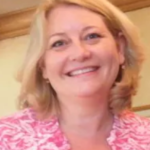 This post was written by Kelly McDonald. Kelly is the Community Outreach Organizer with Get Covered America. She’s also a legislative advocate for people with rare diseases, and on issues of genetic privacy. Ms . McDonald is an Executive Officer for the National PKU Alliance, and serves on the Newborn Screening advisory board of the Texas Legislature.
This post was written by Kelly McDonald. Kelly is the Community Outreach Organizer with Get Covered America. She’s also a legislative advocate for people with rare diseases, and on issues of genetic privacy. Ms . McDonald is an Executive Officer for the National PKU Alliance, and serves on the Newborn Screening advisory board of the Texas Legislature.
Would you be interested in blogging for Act Locally Waco? If so please email [email protected].
by Kenneth Moerbe
As you satisfy your book addiction at the upcoming 52nd Annual Friends of the Library Book Sale, I want you to realize that in this case, satisfying an addiction, is also doing something very supportive of the Waco-McLennan Libraries. Yes, your uncontrollable craving for the latest book by Jodi Picoult or John Grisham, or David Baldacci, or Tom Clancy, or Barbara Kingsolver can result in something very, very positive for our local libraries! What do I mean suggesting that an addiction can be positive for our community?
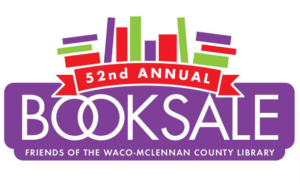 Let me explain. The four day book sale, probably one of the largest in the State of Texas, generates funds to provide many wonderful experiences in our libraries for thousands of our children and adults. We are blessed to have a committed city government that has budgeted something over $3.5 million this year to provide the vast bulk of the materials and staff support for our libraries. But the real ‘icing on the cake’ of our local libraries is provided by the funds generated by the book sale. The Friends of the Waco/McLennan County Library is a volunteer organization that exists for the sole purpose of improving the quality of life in our community through support of the Waco-McLennan County Library. The hours of hard work devoted to the book sale by dozens of members and supporters of the Friends of the Library combined with your lust for historical fiction, or poetry, or non-fiction,or romance novels, or any of a dozen other genres that we folks who love to read can’t resist, pays for the programming that makes our libaries a hub of community life.
Let me explain. The four day book sale, probably one of the largest in the State of Texas, generates funds to provide many wonderful experiences in our libraries for thousands of our children and adults. We are blessed to have a committed city government that has budgeted something over $3.5 million this year to provide the vast bulk of the materials and staff support for our libraries. But the real ‘icing on the cake’ of our local libraries is provided by the funds generated by the book sale. The Friends of the Waco/McLennan County Library is a volunteer organization that exists for the sole purpose of improving the quality of life in our community through support of the Waco-McLennan County Library. The hours of hard work devoted to the book sale by dozens of members and supporters of the Friends of the Library combined with your lust for historical fiction, or poetry, or non-fiction,or romance novels, or any of a dozen other genres that we folks who love to read can’t resist, pays for the programming that makes our libaries a hub of community life.
Here are just a few of the efforts which have been funded so far in 2014 through this annual Book Sale:
- Author presentations and signings
- Free Children’s activities like the Crafty Kids Class, Sensory Storytime, Kids’Computer Classes, Spanish Storytime, Rubber Band Weaving MEET UP, Family Nights @ CENTRAL, Toddler Time, Storytime for Ages 3-6, Baby Time @ West Waco, Block Party @ Central
- Summer Reading Club Performer Fees, Children’s Summer Reading Club Incentives, Tween/Teen Summer Reading Club Incentives, Adult Summer Reading Club Incentives, Book Club Kits for County Libraries, Legos Lab @ Central
- Support and Grants for Little Free Libraries (LFLs) sponsored by Waco Community Development, LFLs created and developed by Rapoport Academy students
- Books for after-school reading instruction sponsored at Estella Maxey by Restoration Haven, Books in English provided over the summer through the Hewitt Library for children of migrant workers
- Material budget supplements of $35,000 for additional materials needed by Central, West Waco, East Waco, and South Waco Libraries, as well as the Genealogy Library, located a the West Waco Library, and the e-book services throughout the library system
- Library awareness and marketing services through bus benches and billboards, Chamber of Commerce directories, sponsorships of the Greater Waco Education Summit Scholarships, and One Book One Waco
- In-kind donations including thousands of items which were added to the Library collections, as well as given to the Hewitt, West, Moody, and McGregor libraries, donated through the Book Sale
- Photo Scanner for The Local History and Archives Project, automatic letter folder for Technical Services, a media browsing chest and additional shelving for DVD and Books-on-CDs for South Waco
Need I say more? Please plan to come and ‘satisfy’ your addictions for good reading at the 52nd Annual Library Book Sale sponsored by the Friends of the Waco McLennan County Library. November 6-9, at the Extraco Center’s Creative Arts and General Exhibits Building. For all the details, click here: 52nd Annual Friends of the Library Book Sale. See you there!
 This post was written by Kenneth Moerbe. Kenneth is a Lutheran minister and the former executive director of Caritas. He has participated on just about every committee and task force in town that has anything at all to do with increasing food security or reducing poverty. When he and his wife, Paula, are not gallivanting all over the world on one of their many travels, they are busy serving on various boards, delivering Meals on Wheels and generally being two of the finest and most fun folks in Waco.
This post was written by Kenneth Moerbe. Kenneth is a Lutheran minister and the former executive director of Caritas. He has participated on just about every committee and task force in town that has anything at all to do with increasing food security or reducing poverty. When he and his wife, Paula, are not gallivanting all over the world on one of their many travels, they are busy serving on various boards, delivering Meals on Wheels and generally being two of the finest and most fun folks in Waco.
The Act Locally Waco blog publishes posts with a connection to these aspirations for Waco. If you are interested in writing for the Act Locally Waco Blog, please email [email protected] for more information.
by Liz Ligawa
 Chances are you have reached this article through a post on your Facebook newsfeed. Being well-versed in the ins and outs of this media outlet, you are probably well aware of a coveted, and infamous symbol. A symbol that is used to convey quick, but not necessarily thorough, feedback. A symbol that will be used 1.8 million times in the next 60 seconds. A symbol that right now probably sits lonely and desaturated in shades of grey and disregard; but by the end of this article, may glow with an affirmative shade of blue: the “Like” button.
Chances are you have reached this article through a post on your Facebook newsfeed. Being well-versed in the ins and outs of this media outlet, you are probably well aware of a coveted, and infamous symbol. A symbol that is used to convey quick, but not necessarily thorough, feedback. A symbol that will be used 1.8 million times in the next 60 seconds. A symbol that right now probably sits lonely and desaturated in shades of grey and disregard; but by the end of this article, may glow with an affirmative shade of blue: the “Like” button.
Now, imagine with me the completely unlikely event that you reach the end of this article and find yourself dissatisfied with the exposition of this subject, or at odds with the perspective of its astute author. If you find that you do not like this article, do you have the same options available to you to “dislike” as you do to “like”? The answer is no, and this absence speaks volumes about our culture’s relationship with dissent. But is agreement the only useful reply?
In social work, one of the skills we are required to learn and develop in becoming competent practitioners is a skill called Reaching for Negative Feedback. When using this skill, the social worker intentionally asks his client for feedback concerning unmet expectations, incompatible goals, unwanted outcomes, or any client experience which could be improved upon. It is a vulnerable yet valuable position for the social worker, and an honoring position for the client. At first, I did not comprehend the necessity of this skill, nor understand why we had to inquire about discontent. That was until I considered our boardrooms, our workrooms, our classrooms, even our living rooms — all common places in which we do not readily give permission to disagree. When was the last time you disagreed about a certain course of action where you work, or learn? When was the last time you were asked about it?
In her TED talk, speaking about the power of disagreement, Margaret Heffernan shares the benefits that disagreement has on progress and development. According to Heffernan, great teams and businesses are created when “people are allowed to deeply disagree.” This concept seems to go against what we have been taught about leadership and management. How do we build consensus if we encourage disagreement? What levels of success might we expect from a company that approves dissent? The issue that Heffernan raises is that it’s not that we never disagree with matters in our workplace, homes, or our communities; it is that most of us simply never voice it.
During a recent meeting I had with my mentor, I found myself struggling with the experience of a lack of permission to disagree. My mentor listened intently as I described my attempts to resolve a progressively, deteriorating dilemma. She would interject, calmly, and pause – giving me time to recognize in my own voice the discomfort I was experiencing. Suddenly, in the midst of my exasperation, she said, “You can say that, Liz. You need to know you can say that.” I stopped. She waited. Everything paused as I observed this unfamiliar, yet deeply empowering gift of permission. I did not know it, but I had been struggling with respecting the power of dissent.
 What was your response the last time you were uninterested, or displeased with a post? Sometimes dissent will be referenced in the comments, but most of the time, it will simply be through the “Like” button left to its passive, default grey. This lack of comment, lack of dissent, takes a significant toll on the strength of our organizations. We sacrifice critical thinking, creativity, and growth. What tends to grow in this type of environment is a sterilizing culture of fear and resentment.
What was your response the last time you were uninterested, or displeased with a post? Sometimes dissent will be referenced in the comments, but most of the time, it will simply be through the “Like” button left to its passive, default grey. This lack of comment, lack of dissent, takes a significant toll on the strength of our organizations. We sacrifice critical thinking, creativity, and growth. What tends to grow in this type of environment is a sterilizing culture of fear and resentment.
Are we bold enough to hear what others have to say? Am I bold enough to receive negative feedback from this post? Waco, we have a lot to offer one another. We are enriched by our many voices; if only we will give them room to be. The integrity of our ideas is not held together by neatly spaced stitches of affirmation, or commendation. Our ideas should show indications of wear, and use. They should have fingerprints and smudges; evidence of being held and evaluated by others. Let them be worn and disheveled; let them be tattered and renovated. Let them be anything other than praised without inspection.
For two decades, Dr. Alice Stewart was the sole dissenter against using radiology on pregnant women due to the effects she observed in the unborn child. In our own country, the Civil Rights Movement was carried by those willing to stand for a collective voice of dissent to the nation’s laws. In Ferguson, a heartbroken community seeks justice through its gathered voice of dissent. Dissent should not be as easy to disregard in our everyday lives as it is on social media. It should find a common respect among other celebrated forms of communication.
You have now reached the end of this article. Consider this my formal attempt at Reaching for Negative Feedback. When was the last time you heard, “Dissenting opinions accepted here”?
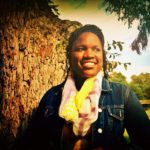 This post was written by Liz Ligawa. Liz is a graduate student of Baylor University where she has found the perfect expression of her community-centered heart in the MDiv/MSW degree program. With a concentration on Community Practice, she is also the adoring mother of one son, Elijah, who prefers to be regarded in public as Spider-Man. She may be reached at [email protected].
This post was written by Liz Ligawa. Liz is a graduate student of Baylor University where she has found the perfect expression of her community-centered heart in the MDiv/MSW degree program. With a concentration on Community Practice, she is also the adoring mother of one son, Elijah, who prefers to be regarded in public as Spider-Man. She may be reached at [email protected].
The Act Locally Waco blog publishes posts with a connection to these aspirations for Waco. If you are interested in writing for the Act Locally Waco Blog, please email [email protected] for more information.
by Stephanie Drum
Did you know that alcohol is the most abused drug among youth and young adults in the state of Texas? Did you know that providing alcohol to minors is a more serious offense than a DWI?
I am the new VASA coordinator for McLennan County. VASA stands for “VOICE Against Substance Abuse.” VASA is a community coalition, a group of concerned adults and youth working together to address issues related to underage/binge drinking, marijuana use, and prescription drug abuse in McLennan County. Our vision is creating a drug and alcohol free culture for youth and young adults.
Last month, I was in Austin with coalition representatives from all over the state of Texas, learning how to identify and address alcohol, marijuana and prescription drug abuse in young adults. I was particularly interested in the success stories shared by seasoned professionals. During the presentations, I furiously scribbled notes about potential strategies we could utilize in McLennan County. I was heartened because many of the communities who were sharing success stories started out by doing exactly what our VASA is doing right now: gathering data.
Specifically, we are gathering data to identify the status of alcohol, marijuana and prescription drug use and abuse in our county. We are in the process of conducting a survey of McLennan County residents, including students, parents and community members, to analyze the use and abuse of alcohol, marijuana and prescription drugs among young adults. The data will also provide an understanding of the community’s perception of substance use and abuse.
 In addition to gathering information, we are implementing environmental strategies such as media campaigns to raise awareness of the dangers of alcohol use and abuse by minors during prom and graduation seasons and the consequences faced by adults who purchase alcohol for minors.
In addition to gathering information, we are implementing environmental strategies such as media campaigns to raise awareness of the dangers of alcohol use and abuse by minors during prom and graduation seasons and the consequences faced by adults who purchase alcohol for minors.
We would love for everyone in McLennan County to know about the VASA and to join us in our work. Here are three basic facts to get you started:
- The VASA coalition is a partnership comprised of community members from various sectors, including students, parents, volunteers, law enforcement, health agencies and many others, who have a stake in the well-being of their community regarding substance abuse.
- The purpose of the coalition is to encourage community mobilization to make changes in community policies, laws and social norms by utilizing data gathered through research and implementing strategies that been proven to be effective in other communities around the state.
- The Texas Department of State Health Services is funding the coalition for five years; the goal is for it to become self-sustaining when the grant ends. The grant is administered locally by VOICE, the largest provider of youth substance abuse prevention services in Texas.
Just like you, I desire safe and healthy environments in which our children and youth can grow and develop into responsible adults, capable of making good decisions. I believe that we can make great strides towards this goal by working together to change the ways in which illicit consumption of alcohol, marijuana and prescription drugs are identified and addressed in our community.
To learn more about the VASA Community Coalition and how you can be a part of our efforts, please contact me.
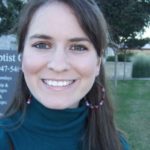 Stephanie Drum is the VASA Community Coalition Coordinator and works at VOICE. She has a Bachelor of Arts from the University of Mary Hardin-Baylor and a MDiv/MSW from Truett Seminary and Baylor University. She loves baking, the country and all kinds of art. Please contact her at [email protected] or (254) 741-9222 – she would love to share more about VASA Community Coalition!
Stephanie Drum is the VASA Community Coalition Coordinator and works at VOICE. She has a Bachelor of Arts from the University of Mary Hardin-Baylor and a MDiv/MSW from Truett Seminary and Baylor University. She loves baking, the country and all kinds of art. Please contact her at [email protected] or (254) 741-9222 – she would love to share more about VASA Community Coalition!
The Act Locally Waco blog publishes posts with a connection to these aspirations for Waco. If you are interested in writing for the Act Locally Waco Blog, please email [email protected] for more information.
by Ashley Bean Thornton
I love that Waco is small-big town or maybe a big-small city. We are small enough that rush hour is still more like “rush 15-minutes” and big enough to have a public radio station to listen to if you happen to get stuck at a light. (Thank you KWBU!) We are small enough that I run into people I know at the grocery store, and big enough that I meet new people with new ideas every day. We are a great size for a city…umm…town…umm…whatever…
Of course there are some challenges with being big-small. As sort of a “small town,” we might be tempted to believe that we all have the same ideas about what Waco should be, and how to go about getting there. In fact, we are big enough and diverse enough that there are many ideas about Waco. We need to make a point of listening to each other to pull those varied ideas together into one coherent vision. On the other hand, as sort of a “big city” we might be tempted to lapse into “big city apathy”– the unfortunate habit of letting “them” make all the decisions and then getting mad at “them” when “they” do something we don’t like. In fact, we are small enough that almost any of us could organize a group of like-minded residents and influence just about any decision being made in our city/town.
Because we are small-ish we all have the very real opportunity and responsibility to participate in the discussions and decisions that shape our community. Because we are big-ish, we need to take communication and participation seriously. It doesn’t just happen automatically. We have to be intentional about it. Our local government, school district and other institutions need to continue to provide opportunities for input, to make sure those opportunities are accessible to a wide range of people, and to publicize those opportunities far and wide in plenty of time for people to plan to participate. “We the people” need to take full advantage of the numerous opportunities available to us to join in the civic conversation. (The phrase “use it or lose it” comes to mind.) Here are a few ideas for doing that:
Participate in city planning with the new “Plan Greater Waco” on-line site at wacoplan.mindmixer.com. – The City of Waco and the Waco Metropolitan Planning Organization (MPO) are working right now on long-term plans that will shape and guide Waco for the next 10, 20, 30 years. The “Plan Greater Waco” site is open for everyone in the community to pitch ideas and give feedback on topics like “What are the three most important challenges facing Waco and McLennan County that we need to address between now and 2040?” and “What are our best resources that we should build on to strengthen our community?” On the site, you can give your own input, and see and comment on what your fellow residents are saying. It’s easy, and fun, and your feedback goes directly to the folks in the planning office.
Get involved with “Prosper Waco.” – Prosper Waco is our community-wide initiative to address challenges related to the high rate of poverty in Waco. Those guiding this initiative have wisely adopted a holistic approach of simultaneously working on health, education and financial stability. The initiative is designed based on the “Collective Impact” philosophy that calls for all of us to work together on a common agenda. Prosper Waco has been years in the making and has already benefitted from the input of many, many voices. If you would like to receive updates about the progress of Prosper Waco, send a note expressing your interest and requesting to be placed on the distribution list to [email protected].
Keep an eye out for town hall meetings and information sessions, and go! – Our various institutions – the city, the school district, the public health district, Waco Transit etc. – regularly hold town hall meetings and public information sessions for the express purpose of getting more community input into issues that affect our community. Even in this age of Facebook and Twitter, going to meeting is still a great way to get to know like-minded and different-minded neighbors, and to get to know the people who work for you in the various city, school-district, county and other public offices. Two great places to find out about meetings are the Waco Trib and Actlocallywaco.org. If you hear about a meeting that sounds important and interesting make it a habit to call a friend or neighbor and go!
Serve on a board, commission or committee – The civic work of our big-small community gets done to a large extent by boards, commissions and committees. There are over 30 boards and commissions listed on the City of Waco website and they welcome applications from every Waco resident. In addition to city boards and commissions, every non-profit in town has a board to help plan its work and committees to help carry out that work. Participation on one of these boards can give you a whole new appreciation for what is required to build a great community. Not sure you have the skills to serve on a board? Consider applying to participate in “Leadership Plenty,” a free 10-week leadership development program available to Wacoans who want to prepare themselves for effective civic participation. For more information, google “Leadership Plenty Institute Waco.”
Waco is a terrific place to live. We are big enough to dream audaciously, and small enough to know that we have to depend on each other and work together to make those dreams come true. A big “Thanks!” to all of you who are already working hard to make our community great. If you haven’t gotten involved yet, there’s no time like the present for joining in! Start with something small like leaving a comment on the wacoplan.mindmixer.com site or going to a meeting. Before you know it, you will be the one inviting others to the party!
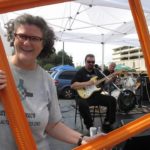 This Act Locally Waco blog post is by Ashley Bean Thornton, the Manager of the www.www.actlocallywaco.org website and the editor of the Friday Update newsletter. The Act Locally Waco blog publishes posts with a connection to these aspirations for Waco. If you are interested in writing for the Act Locally Waco Blog, please email [email protected] for more information.
This Act Locally Waco blog post is by Ashley Bean Thornton, the Manager of the www.www.actlocallywaco.org website and the editor of the Friday Update newsletter. The Act Locally Waco blog publishes posts with a connection to these aspirations for Waco. If you are interested in writing for the Act Locally Waco Blog, please email [email protected] for more information.
By Ashley Bean Thornton
Listen to the chatter on the street in Waco right now and this is what you will hear: “Have you been to the new stadium yet?” “Did you go to the first game?” “Amazing, right?!?”
You could probably throw a rock anywhere in Waco and hit fifteen people who are more devoted football fans than I am. But, despite my un-partriotically lukewarm attitude toward the national sport of Texas, I can’t help but be impressed by McLane Stadium. Wow! If you have to watch a football game, that is one fine place to do it!
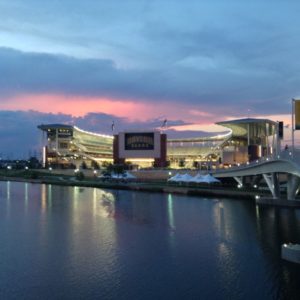 Like about nine million other Baylor alums (give or take a few), I couldn’t resist snapping a pic of the new stadium and posting it on Facebook. A friend of mine commented on my post, “Does George Jetson have his own parking space?” His comment summed up what I was feeling when I took the picture. Gleaming on the banks of the Brazos, McLane Stadium looks like the future.
Like about nine million other Baylor alums (give or take a few), I couldn’t resist snapping a pic of the new stadium and posting it on Facebook. A friend of mine commented on my post, “Does George Jetson have his own parking space?” His comment summed up what I was feeling when I took the picture. Gleaming on the banks of the Brazos, McLane Stadium looks like the future.
Do you think ten years ago there was someone…some starry-eyed, Pollyanna-ish, naïve Baylor supporter….imagining that in ten years the talk of the town would be “sail-gating” at the new on-campus, on-the-river stadium?
Think about it…Ten years ago, in 2004, no one I knew had heard the name “RG3.” Art Briles was happily racking up wins down the road in Houston. Baylor was coming off one disappointing season (3 wins, 9 losses), and heading into another (3 wins, 8 losses). Do you think there was anyone anywhere imagining that in ten years we would be hearing people say, like ESPN said recently, “Few college football cathedrals can match McLane … They don’t have to dream anymore on BU’s campus. All the pieces are in place to cement a spot among the nation’s best, year in and year out”? Really, do you think anyone back then was imagining we would be hearing that kind of pro-Baylor-speak from the TV sports people?
Yes, I think there were people who were imagining that very thing.
Even when it looked wildly improbable, there must have been people who expected we would get here. Yes, when they talked about it their friends rolled their eyes and smiled indulgently, but they kept talking about it anyway. When things looked like they were getting worse instead of better, they still promoted their vision every chance they got. Even when it was embarrassing and people were tired of hearing about it, they kept plugging away. They must’ve been constantly on the alert to seize opportunities, to put a piece in place here, another piece in place there until finally all the pieces came together. I’m pretty sure if there hadn’t been people like that then, we wouldn’t be hearing people say things like, “Awesome!” and “Fabulous!” now.
So, with great appreciation for the football visonaries of 10 years ago, and with our new shiny “cathedral” on the river as inspiration, let’s talk about the kinds of things we believe people could be saying in Waco ten years from now – in 2024:
“We thought about moving out of town, but we stayed for the schools.” — Ten years from now our school system is a magnet drawing people into Waco and keeping them here. College professors and employers are raving about Waco ISD grads. “They’re so well prepared.” “They know how to think.” “They’re such terrific problem solvers.” Our very own WISD grads are the technicians, engineers, health providers, teachers, artists and entrepreneurs who are pushing the Waco economy to new heights.
“I found a great job in Waco!” – The businesses we have now are expanding and hiring. Businesses and industry from other places have moved into Waco and started hiring. Our hometown entrepreneurs are growing and hiring. College grads are looking here first to start their careers. I imagine sitting on the plane from Dallas to Waco, overhearing the person sitting behind me tell her companion, “Waco is a great place to work. There are all kinds of new opportunities cropping up all the time. You’ll be glad you came.”
“This is such an easy town to be healthy in.” — I heard someone say this once about Austin, in the future we’ll be saying it about Waco. I envision healthy food readily accessible everywhere in town, in every neighborhood. Even hard-case fast food junkies like me will be giving in to peer pressure and starting to eat healthy. Parks, bike lanes, trails, and gyms will be bustling with activity as we have fun, get to know each other, and get fit all at the same time.
“How about if I meet you downtown somewhere? We can decide what to do when we get there.” — Ten years from now, people will be taking for granted that there’s always something great to do downtown. Downtown will be our gathering place, the hub of our community, the place where we run into our neighbors and friends, the place where we meet new people. It will be bubbling with enterprise, diversity, art, ideas, and great food! Businesses will be fighting for spots on Austin and Elm and 25th Street. Downtown residents will be enjoying their morning cups of coffee as they walk or bike to work.
“Let’s just take the bus.” – In ten years, people of all different income levels will be taking full advantage of our excellent public transportation system. We will all be enjoying the option to ride the bus to work, or to the doctor, or to meet friends to hear some music downtown. This freedom of movement will open up new job opportunities for many of us. We’ll be healthier, our streets will be less congested, our air will be cleaner, and we’ll be saving money because of it.
And, finally, the best thing we’ll be hearing in Waco in 2024…
“I wish I had invested in Waco ten years ago!”
 This Act Locally Waco blog post is by Ashley Bean Thornton, the Manager of the www.www.actlocallywaco.org website and the editor of the Friday Update newsletter. The Act Locally Waco blog publishes posts with a connection to these aspirations for Waco. If you are interested in writing for the Act Locally Waco Blog, please email [email protected] for more information.
This Act Locally Waco blog post is by Ashley Bean Thornton, the Manager of the www.www.actlocallywaco.org website and the editor of the Friday Update newsletter. The Act Locally Waco blog publishes posts with a connection to these aspirations for Waco. If you are interested in writing for the Act Locally Waco Blog, please email [email protected] for more information.
by Fernando Arroyo
She was only four feet tall. But, with a grip like a vice, she yanked at my arm while scolding me — in Mayan, in a voice that would rival Chef Gordon Ramsay of “Kitchen Nightmares” fame — to immediately stop stirring the pot of maize that was simmering on the open fire in front of me. I was learning about the roots of my Mexican indigenous culture, and evidently I was not a very good student. I had only ONE JOB, to stir the pot, and I couldn’t do it right! My eyes searched one of the many one-room, thatched-roof huts that dotted the village as I looked desperately for my professor who grew up in this village and was my translator.
The translation was, “You’ll spoil it! We must take great care in how we do this. Every step of the meal matters. Stir the maize in one direction. If you start stirring in the opposite direction, you will undo the care, work and energy that began in the stirring of the pot. Only one direction next time. Give it to me!”
Even though I did not master that art of making campfire joloch tamales that day, the instruction and wisdom I gleaned from the little Mayan chef was far more profound. She gave me eyes to see the wonder in our ordinary actions. I was struck by how even the most seemingly ordinary tasks and processes of the community had an incredible significance and power within them.
How do I use my new eyes at home in my own neighborhood? Through sharing.
I decided to discover my neighbors’ stories and to share my own. In doing so I found that creative energy and radical acts of kindness cascade from our neighbors and surge through our streets, parks, buildings and yards. In my neighborhood, Sanger Heights, strangers and friends are joining to share life, resources and transformation. Shareable.net describes what I see and hear in my neighborhood:
“When individuals embrace sharing as a worldview and practice, they experience a new, enlivening way to be in the world. Sharing heals the painful disconnect we feel within ourselves, with each other, and the places we love. Sharing opens a channel to our creative potential. Sharing is fun, practical, and perhaps most of all, it’s empowering. It enables us to experience and do things we never thought possible.”
Most of these kinds of connections are not begun by programs or institutions but by decentralized and self-organized groups stepping out to be intentional neighbors. Here are some experiments that my family and I have tried to expand our sharing opportunities:
Toy Swaps — I exchanged some toys collecting dust with new-to-the-Arroyo-kids toys at no other cost.
Clothing Swaps — We de-cluttered our closet and got a new wardrobe exchanging clothes in good condition
Meal-sharing — I cooked four casserole dishes with spaghetti and froze them. During a swap night with other families, I traded three of my frozen dinners for three different ones. Bam! I had three heat and ready-to-eat unique dinners I didn’t have to cook.
Car-sharing — Some friends are eschewing purchasing individual vehicles and instead are sharing a car, a van, and a truck. They share the maintenance costs and save themselves the full expense of vehicle ownership. Plus, they decrease their gas use and car pollution.
Cow-sharing — For the last two years, my friend and I have shared the purchase of a grass-fed cow from World Hunger Relief, Inc. A quarter of Rico the Cow fed my family for a year!
Do-It-Ourselves Education — On Tuesdays, my children and I meet up with other families from inside and outside the neighborhood to build balloon rockets, conduct archaeological digs, investigate erosion principles, and much more. On Fridays, I co-lead a neighborhood Spanish-exposure time helping children and their parents fall in love with languages, especially Spanish, my native tongue.
Peer-to-Peer Lending — Congregation members of a local church called Hope Fellowship are experimenting in lending to one another at zero percent interest as a way to disrupt the negative debt cycles crated by Cash-Advance/Payday Lending institutions and to invest in one another instead of the financial markets alone. This idea and practice was inspired by theologian Ched Myer’s Sabbath Economics series. Members of this project, called the Mustard Seed Fund, are excited about sharing the good news of supplemental economic systems that value people and places over profits.
Nuestra Voz Open Mic Night — Artists, musicians, poets, writers and more gather the second Saturday of every month at 7PM at The Art Forum of Waco (1826 Morrow) to share their stories and create space for good ol’ fashioned “analog” social networks. I co-founded this event in partnership with Jenuine Poetess from Word Around Waco, and the Art Forum of Waco.
Halloween On Colcord — Ghosts, Ghouls, and Goblins from all walks of life gather to enjoy the sights, sounds and candy at this yearly neighborhood event. Last year over a thousand hotdogs were devoured. Neighborhood churches, organizations, and groups host front yard activities. Contact me if you are interested in hosting a yard or an activity.
Sanger-Heights Neighborhood Association — I’m on the board. We’re working on ways to boost our neighborhood economy. We are conspiring to help create celebrations that represent our neighbors’ stories like Dia de los Niños and more. We are developing our 501(c)3 status and laboring together to help repair our sidewalks and our homes that are layered with history and culture.
According to Robert Sampson’s Great American City, the most resilient and cohesive neighborhoods, where neighbors take joy in the life of the neighborhood, are those where neighbors know one another and know that those around them will help in their time of need. In other words, people love their neighborhoods when they know each others’ stories and are there for one another when things go down.
Live these stories with me…or live into the ones in your own neighborhood. Move your barbecue pit and lawn chairs from your fenced-in backyard to the front yard and share a meal with a stranger or a new friend down the street. For a more enriching experience, share that meal with folks from another faith tradition, financial bracket, or cultural experience.
We are all social beings and our relationships and places make us who and what we are. Become an active part of one anothers’ stories. In the process, you too will receive new eyes to experience the exquisiteness of love and life in your place.
What kinds of stories do you see in your neighborhood? Share your stories in the comments. Contact me for more information.
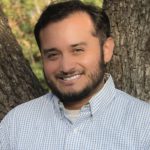 This blog post was written by Fernando Arroyo. Fernando migrated from the Yucatan Peninsula to Waco and lives in the Sanger-Heights Neighborhood with his wife/best friend, three young children, (too many) ornery chickens, his wire-haired dog, and delightful neighbors. He works as a corporate instructor with Temple College and McLennan Community College teaching courses in workforce development, technology, leadership and management. Fernando’s experience includes being on staff and on the board of a number of nonprofit and for-profit organizations improving affordable housing, youth violence reduction, youth entrepreneurship, immigrant advocacy, public and private education, and community and economic development. He holds a Bachelor’s degree from Baylor University and a Master’s from Concordia University. His mission is to serve as a catalyst for peace, healing, justice, and reconciliation. Contact him at l[email protected]. The Act Locally Waco blog publishes posts with a connection to these aspirations for Waco. If you are interested in writing for the Act Locally Waco Blog, please email [email protected] for more information.
This blog post was written by Fernando Arroyo. Fernando migrated from the Yucatan Peninsula to Waco and lives in the Sanger-Heights Neighborhood with his wife/best friend, three young children, (too many) ornery chickens, his wire-haired dog, and delightful neighbors. He works as a corporate instructor with Temple College and McLennan Community College teaching courses in workforce development, technology, leadership and management. Fernando’s experience includes being on staff and on the board of a number of nonprofit and for-profit organizations improving affordable housing, youth violence reduction, youth entrepreneurship, immigrant advocacy, public and private education, and community and economic development. He holds a Bachelor’s degree from Baylor University and a Master’s from Concordia University. His mission is to serve as a catalyst for peace, healing, justice, and reconciliation. Contact him at l[email protected]. The Act Locally Waco blog publishes posts with a connection to these aspirations for Waco. If you are interested in writing for the Act Locally Waco Blog, please email [email protected] for more information.
by Phil York
Football season is here. As an Aggie transplant to Waco, I have a new struggle: competing loyalties as I slowly learn to cheer for my new home team, Baylor University.
On August 28th, the Family Health Center auditorium was buzzing with the energy of a packed football stadium on the Brazos. But, unlike a crowd that is divided by team loyalties, this audience was united by a powerful bond.
More than 80 Wacoans met under the leadership of Citizens for Responsible Lending (CRL), a group established this year by and for Wacoans for the purpose of advocating for an economically healthy Waco. The event was dubbed, “The State of Pay Day Lending Rally.”
Robin Reid spoke first at the Rally. Robin was the true expert in the room: she took out a pay day loan several years ago and had the courage to share her personal story with us. Robin reminded us that pay day loans provide an important service that is not provided by traditional banks. However, predatory practices such as intimidating phone calls at her home and workplace, automatic renewals, and exorbitant fees are not acceptable. As Robin highlighted, the discussion that night was not about being anti-business; but about being pro-good business.
After Robin, representatives from CRL (Alexis Christensen, Ryn Farmer, Rucker Preston and Josh Caballero), Texas Appleseed (Ann Baddour), and Texas Catholic Conference (Jennifer Carr Allmon) provided an update about Pay Day lending on the national, state and local levels. Together, the presenters answered several important questions, including these:
- Why should we care about pay day lending in Waco?
- What further steps can you take about pay day lending?
Why should we care about pay day lending in Waco?
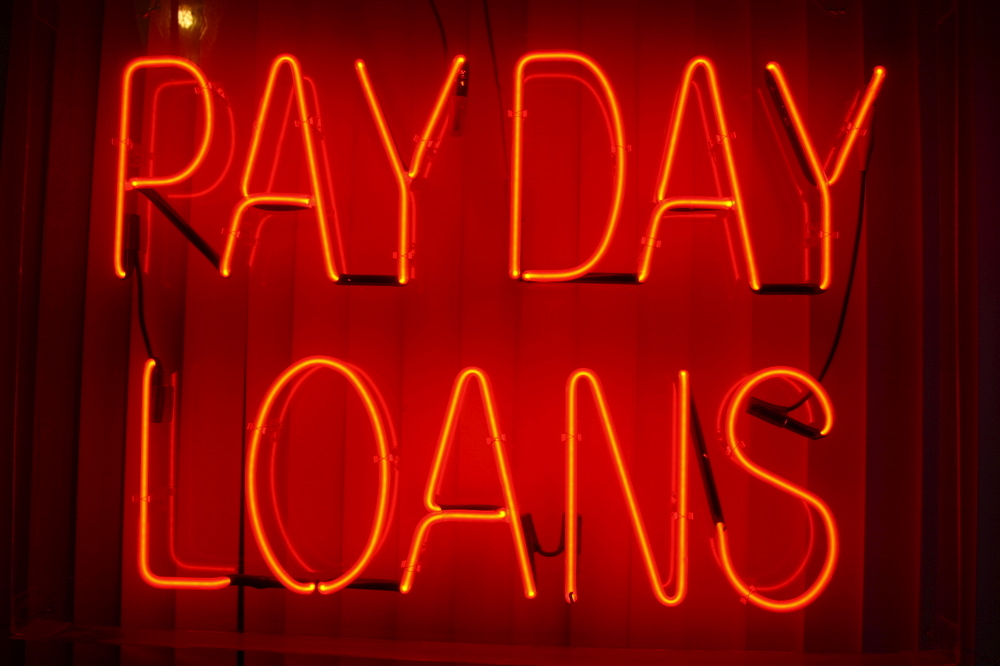 We should care about Pay Day lending because of the negative impact it has on our local economy. Pay Day lending is a big presence in Waco. Waco has 29 licensed Pay Day Loan/Title Loan storefronts. That is more than the total number of McDonalds (8) and Starbucks (5) combined! Under the current laws that do not limit fees, size of the loan, rollovers or refinances, and do not consider the ability to repay based on income, Pay Day lending is a big loser for the Waco community.
We should care about Pay Day lending because of the negative impact it has on our local economy. Pay Day lending is a big presence in Waco. Waco has 29 licensed Pay Day Loan/Title Loan storefronts. That is more than the total number of McDonalds (8) and Starbucks (5) combined! Under the current laws that do not limit fees, size of the loan, rollovers or refinances, and do not consider the ability to repay based on income, Pay Day lending is a big loser for the Waco community.
Here are a few facts to give you a sense of the economic impact:
- Borrowers pay an average of $23 in fees every 2-4 weeks for every $100 borrowed. Installment payday borrowers pay about $100 in fees per $100 borrowed.
- 602 cars were repossessed last year by auto title lenders in the Waco area. To put that in perspective, there are 1,900 parking spaces available in downtown Waco for Baylor Football games. Imagine the cars in almost a third of those spaces being repossessed and their drivers left without transportation to get to work or to take care of the other necessessities of life.
- 10.5 million dollars were drained from the Waco area economy in 2013 because of excessive fees.
What further steps can you take about Pay Day lending?
Join us! – This powerful rally was the result of concerned Wacoans coming together. When I spoke to Jennifer of the Texas Catholic Conference after the rally, she commented that Waco is one of the most proactive and caring communities she has visited in her Texas-wide research. Whereas other communities need extra support, Wacoans boldy say “we got this!” You can join your neighbors and friends who are already part of Citizens for Responsible Lending (CRL). Contact Alexis Christensen at [email protected] or 254-235-7358 to learn more.
Know your rights – Organizations such as the Texas Rio Grande Legal Aid provide literature about pay day lending. If you or some of your friends and family are already ensnared in debt related to Pay Day or Title lending, one of the most powerful tools for reducing the negative effect is to know your rights. Here are two helpful bulletins:
Share your opinion with the Waco City Council – At the rally, Council Member Toni Herbert (District 4) reminded us that there is a designated item on each Council meeting agenda called “hearing of visitors.” This is time specifically set aside for citizens to have a chance to voice concerns. You could use this time to voice your concerns about Pay Day lending. Council meetings are held the first and third Tuesdays of every month. Here’s a link to more information about how our city council works: Waco City Council.
Sign the petition supporting a Waco City Council resolution about Pay Day Lending – The Citizens for Responsible Lending have drafted a resolution that we would like for the Waco City Council to adopt. If adopted, it would state that our city council resolves to:
- Urge the Texas Legislature and Governor of Texas to adopt a 36% annual percentage cap on fees/interest,
- Encourage the City of Waco to explore alternatives and ordinances,
- Follow the same format of cities such as Bryan and College Station that passed ordinances. Currently. (18 cities have passed ordinances)
If you would like to sign the petition urging our city council to adopt this resolution, contact [email protected].
Alas, football season is here.
Football seasons have winners and losers, and they come and go. Some seasons are filled with “band-wagoners” who follow in the wake of the winning team. Unlike the fickle nature of football followership, the diligent passion, care and concern of Wacoans is as constant as the river Brazos.
Robin Reid’s story is our story. Predatory lending practices that threaten the financial security of many Waco residents are a concern for all Waco residents. These practices threaten the economic health of our whole community by preying on residents who are working hard to gain a financial foothold. We know how to join hands and act locally to insist on fair, pro-good business practices, and that is exactly what we are doing.
 Phil York, Director of Development at Waco Habitat for Humanity, is a self-described “policy nerd;” he is also the Act Locally Waco housing and homelessness policy blogger. You can direct questions to Phil to [email protected]. Would you be interested in blogging for Act Locally Waco? If so please email [email protected].
Phil York, Director of Development at Waco Habitat for Humanity, is a self-described “policy nerd;” he is also the Act Locally Waco housing and homelessness policy blogger. You can direct questions to Phil to [email protected]. Would you be interested in blogging for Act Locally Waco? If so please email [email protected].
by Julie Talbert
After being laid off from her first job, Doll Wilkerson spent time caring for her sick mother until she passed away. Earlier this year, she decided it was time to find a new job. Doll has a disability and thanks MHMR for helping her get hired at Big Lots. The final challenge for Doll was to figure out how to get home from work at night.
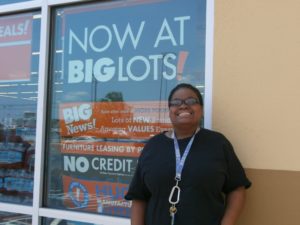 Doll, who lives in north Waco, shares this challenge with as many as 26% of residents living in parts of north and east Waco who do not have access to vehicle. Waco Transit’s bus service stops running at 7:15 p.m., leaving many without a way to get to or from work at night.
Doll, who lives in north Waco, shares this challenge with as many as 26% of residents living in parts of north and east Waco who do not have access to vehicle. Waco Transit’s bus service stops running at 7:15 p.m., leaving many without a way to get to or from work at night.
For now, a solution exists. Doll was excited to learn about the Evening LINK; the first-ever evening transportation service available Monday – Saturday from 8:30 p.m. – 11:30 p.m. Evening LINK is a project of Workforce Solutions in partnership with Waco Transit and several other local agencies.
The Evening LINK is successfully addressing a growing need of residents working non-standard hours. Jobs in the food service, retail, health and medical, and manufacturing industries often require employees to work nights. The Evening LINK provides approximately 400 passenger trips a month using three vehicles and a reservation system to get workers in the greater Waco area to and from work safely, reliably, and affordably. Eighty percent of passengers are employed full time and 90% report that the service is extremely important to keeping their job. More than 60 businesses have employees who have used the Evening LINK.
Doll has been riding the Evening LINK five nights a week for the last three months. The service is helping her meet her goal of “living a healthy and independent life.” At 40, feeling independent is important to Doll and she expresses her excitement about her new life by saying, “My disability may slow me down, but it won’t stop me.”
 This Act Locally Waco blog post was written by Julie Talbert. Julie manages the child care and public transportation contracts for Workforce Solutions for the Heart of Texas. She believes that access to affordable, dependable and high-quality early education and public transportation systems are critical to a vibrant community. They are necessary to help us realize a vision of healthy children, strong families, and thriving economic opportunities.
This Act Locally Waco blog post was written by Julie Talbert. Julie manages the child care and public transportation contracts for Workforce Solutions for the Heart of Texas. She believes that access to affordable, dependable and high-quality early education and public transportation systems are critical to a vibrant community. They are necessary to help us realize a vision of healthy children, strong families, and thriving economic opportunities.
The Act Locally Waco blog publishes posts with a connection to these aspirations for Waco. If you are interested in writing for the Act Locally Waco Blog, please email [email protected] for more information.

